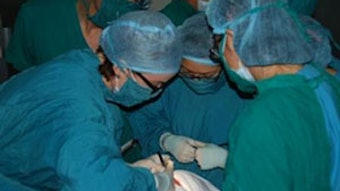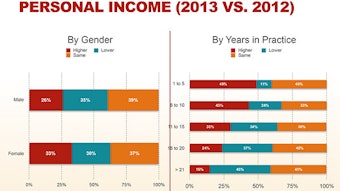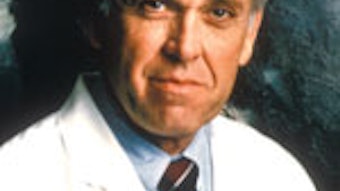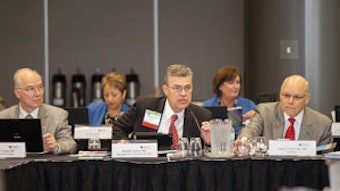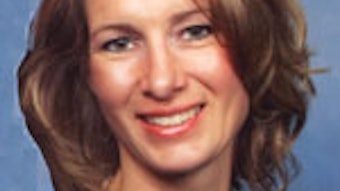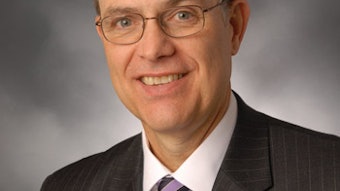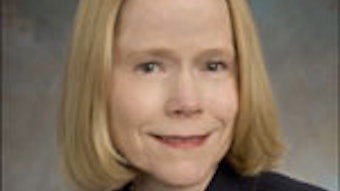A Hard Lesson in Choosing Patients: Management of Endemic Goiter in Gitwe, Rwanda
Jeremiah C. Tracy, MD Although many Americans think of Rwanda as a place of violence and starvation, the reality is far different. The nation has moved past the war and genocide of the 1990s and during the last 20 years Rwanda has made great strides. It has the highest literacy rate in central Africa, and incentives to international investors have led to a rapid increase in the nation’s GDP. Despite these advances, the country’s medical system lags behind. At the premier hospital in the nation’s capital, King Faisal Hospital, there is not a single otolaryngologist on staff. Medical Missions for Children (MMFC) has led mission trips to the town of Gitwe, Rwanda, since 2004. In collaboration with local contacts, this site is now a fully functioning hospital with six general practitioners and two obstetricians. A new medical school (Rwanda’s second) is being built nearby. The connection began when critical care nurse, U.S. citizen, and Rwandan ex-patriot Vianny Ruhumbeza met with Denny Snyder, MD, of MMFC. As Rwanda struggled to rebuild in the late 1990s, Vianny returned home to help manage the family home outside Gitwe. Vianny recognized the need for surgical care in this rural town in the mountains of southwestern Rwanda. MMFC now runs several trips to Gitwe Hospital each year, providing surgical care to the people in the surrounding region. The team leader, Jagdish Dhingra, MD, has been traveling to Gitwe annually since 2004. In March 2014 I was able to join an annual trip to this site, offering surgical treatment for patients suffering from endemic goiter. Rwanda is an iodine-deficient region. Although an iodinization program is in place, many families live as subsistence farmers and do not typically purchase food from a store. In addition, the local diet is comprised in large part by goitrogens (cassava, potatoes, and cabbage). As a resident, it was a great exercise for me to think through the diagnostic work-up under absolutely minimal conditions. What aspects are really necessary? This is a far cry from my experience working at an academic medical center in Boston; patients have always been seen previously by endocrinologists, often had multiple FNA procedures, and in some cases even a CT scan to work-up their “neck mass.” In Rwanda we generally had the history and physical exam. Some patients had seen other doctors previously, and may have even had basic thyroid function tests, but most did not. What was the appropriate course of action in order to ensure we were doing the right thing for these patients and not providing second-class care? On the first day, 60 patients were found to be good surgical candidates. We knew that we had the time, supplies, and stamina to take care of only 30 at most; and new patients continued to show up daily. On days one and two, I was involved only in the operative and post-operative care of patients, and things went quite well. Repetition allowed us to work efficiently and remove five or more huge goiters in a day. On day three my role was expanded. As usual, we had twice the scheduled number of patients show up. Dr. Dhingra told me, “Go ahead, take a history, examine them, and decide who we should operate on.” This entailed choosing who among many would have surgery, and who would have to return next year. In many cases, the patients and their families had walked for hours to get to Gitwe. Some had lived with huge goiters affecting their activity and diet for decades. Others were as young as 18 years old and faced the rest of their lives with this condition. To make matters more complicated, Gitwe is a small town. Many of these people knew each other, may even have been distantly related. I didn’t want to turn people away. I wanted to operate all night long. We discussed the safe allocation of resources. I was forced to acknowledge our inability to help every patient. Those discussions were the most difficult I’ve had in my young career. In America, we deal with healthcare rationing every day. Will insurance pay for a lab test or an imaging study? How soon can we get this patient on the OR schedule? But as residents we are often sheltered from the actual decision making. On this trip I had my first chance to participate in those difficult decisions. This was an invaluable lesson, both as a physician and as a human being. The most important memory I have from the trip is of squatting outside the hospital in order to be at eye level with a dozen hopeful, seated patients, and having to tell them, through an interpreter, why some would have surgery and some would not. I look forward to returning next year, in order to help those who were turned away.
Jeremiah C. Tracy, MD
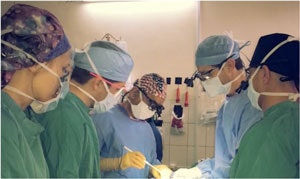 Team leader Dr. Dhingra takes residents through a thyroidectomy procedure.
Team leader Dr. Dhingra takes residents through a thyroidectomy procedure.Although many Americans think of Rwanda as a place of violence and starvation, the reality is far different. The nation has moved past the war and genocide of the 1990s and during the last 20 years Rwanda has made great strides. It has the highest literacy rate in central Africa, and incentives to international investors have led to a rapid increase in the nation’s GDP. Despite these advances, the country’s medical system lags behind. At the premier hospital in the nation’s capital, King Faisal Hospital, there is not a single otolaryngologist on staff.
Medical Missions for Children (MMFC) has led mission trips to the town of Gitwe, Rwanda, since 2004. In collaboration with local contacts, this site is now a fully functioning hospital with six general practitioners and two obstetricians. A new medical school (Rwanda’s second) is being built nearby. The connection began when critical care nurse, U.S. citizen, and Rwandan ex-patriot Vianny Ruhumbeza met with Denny Snyder, MD, of MMFC. As Rwanda struggled to rebuild in the late 1990s, Vianny returned home to help manage the family home outside Gitwe. Vianny recognized the need for surgical care in this rural town in the mountains of southwestern Rwanda.
MMFC now runs several trips to Gitwe Hospital each year, providing surgical care to the people in the surrounding region. The team leader, Jagdish Dhingra, MD, has been traveling to Gitwe annually since 2004. In March 2014 I was able to join an annual trip to this site, offering surgical treatment for patients suffering from endemic goiter. Rwanda is an iodine-deficient region. Although an iodinization program is in place, many families live as subsistence farmers and do not typically purchase food from a store. In addition, the local diet is comprised in large part by goitrogens (cassava, potatoes, and cabbage).
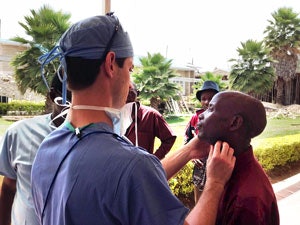 Dr. Tracy evaluates a patient with a neck mass.
Dr. Tracy evaluates a patient with a neck mass.As a resident, it was a great exercise for me to think through the diagnostic work-up under absolutely minimal conditions. What aspects are really necessary? This is a far cry from my experience working at an academic medical center in Boston; patients have always been seen previously by endocrinologists, often had multiple FNA procedures, and in some cases even a CT scan to work-up their “neck mass.” In Rwanda we generally had the history and physical exam. Some patients had seen other doctors previously, and may have even had basic thyroid function tests, but most did not. What was the appropriate course of action in order to ensure we were doing the right thing for these patients and not providing second-class care?
On the first day, 60 patients were found to be good surgical candidates. We knew that we had the time, supplies, and stamina to take care of only 30 at most; and new patients continued to show up daily. On days one and two, I was involved only in the operative and post-operative care of patients, and things went quite well. Repetition allowed us to work efficiently and remove five or more huge goiters in a day.
On day three my role was expanded. As usual, we had twice the scheduled number of patients show up. Dr. Dhingra told me, “Go ahead, take a history, examine them, and decide who we should operate on.” This entailed choosing who among many would have surgery, and who would have to return next year.
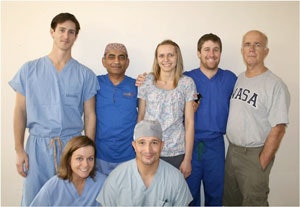 Surgical team (clockwise from upper left): Jeremiah Tracy, Jagdish Dhingra, Tatyanna Lashchuk, Andrew Gregg, David Gregg, Geoff Krampitz, and Ashley-Marie Richards.
Surgical team (clockwise from upper left): Jeremiah Tracy, Jagdish Dhingra, Tatyanna Lashchuk, Andrew Gregg, David Gregg, Geoff Krampitz, and Ashley-Marie Richards.In many cases, the patients and their families had walked for hours to get to Gitwe. Some had lived with huge goiters affecting their activity and diet for decades. Others were as young as 18 years old and faced the rest of their lives with this condition. To make matters more complicated, Gitwe is a small town. Many of these people knew each other, may even have been distantly related.
I didn’t want to turn people away. I wanted to operate all night long. We discussed the safe allocation of resources. I was forced to acknowledge our inability to help every patient. Those discussions were the most difficult I’ve had in my young career.
In America, we deal with healthcare rationing every day. Will insurance pay for a lab test or an imaging study? How soon can we get this patient on the OR schedule? But as residents we are often sheltered from the actual decision making. On this trip I had my first chance to participate in those difficult decisions. This was an invaluable lesson, both as a physician and as a human being. The most important memory I have from the trip is of squatting outside the hospital in order to be at eye level with a dozen hopeful, seated patients, and having to tell them, through an interpreter, why some would have surgery and some would not. I look forward to returning next year, in order to help those who were turned away.

